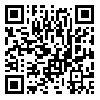Volume 10, Issue 2 (10-2013)
J Res Dev Nurs Midw 2013, 10(2): 26-34 |
Back to browse issues page
Download citation:
BibTeX | RIS | EndNote | Medlars | ProCite | Reference Manager | RefWorks
Send citation to:



BibTeX | RIS | EndNote | Medlars | ProCite | Reference Manager | RefWorks
Send citation to:
Otaghi M, Hassani P, Zagharie Tafreshi M, Nikbakht Nasrabadi A. Challenge in Acceptance of Heamodialysis: A Part of a Grounded Theory. J Res Dev Nurs Midw 2013; 10 (2) :26-34
URL: http://nmj.goums.ac.ir/article-1-453-en.html
URL: http://nmj.goums.ac.ir/article-1-453-en.html
1- , masoome_otaghi@yahoo.com
Abstract: (30244 Views)
Background and objective: The rate of end-stage renal disorder (ESRD) in Iran, 12%, is more than the worldwide range. The people with Hemodialysis are greatly under physical, mental and social pressures that make the acceptance of Hemodialysis difficult. Since the acceptance can be the beginning point of adaptation, this study aimed to explore the challenge in acceptance of Hemodialysis.
Material and Methods: This grounded theory study was undertaken in the Hemodialysis wards of the hospitals affiliated with Shaheed Beheshti University of Medical Sciences in Tehran. The first samples were selected via purposive sampling and the later ones with theoretical sampling till data saturation (N=24). Semi-structured interview, field notes and memos were used for data collection. The data was analyzed by using Strauss and Corbin method. Data rigor was confirmed by Lincoln and Goba criteria, considering ethical points. Results: The challenge in acceptance of Hemodialysis emerged the categories of acceptance (by force, experience, reasoning or social norms) and lack of acceptance (subjective or objective) of necessity of Hemodialysis as well as their related codes.
Conclusion: The people on Hemodialysis encounter a challenge for acceptance of Hemodialysis. Education as well as personal, familial and social supports can resolve this challenge by changing lack of acceptance (subjective or objective) or acceptance by force to acceptance (by experience, reasoning or social norms).
Material and Methods: This grounded theory study was undertaken in the Hemodialysis wards of the hospitals affiliated with Shaheed Beheshti University of Medical Sciences in Tehran. The first samples were selected via purposive sampling and the later ones with theoretical sampling till data saturation (N=24). Semi-structured interview, field notes and memos were used for data collection. The data was analyzed by using Strauss and Corbin method. Data rigor was confirmed by Lincoln and Goba criteria, considering ethical points. Results: The challenge in acceptance of Hemodialysis emerged the categories of acceptance (by force, experience, reasoning or social norms) and lack of acceptance (subjective or objective) of necessity of Hemodialysis as well as their related codes.
Conclusion: The people on Hemodialysis encounter a challenge for acceptance of Hemodialysis. Education as well as personal, familial and social supports can resolve this challenge by changing lack of acceptance (subjective or objective) or acceptance by force to acceptance (by experience, reasoning or social norms).
Type of Study: Original Article |
Send email to the article author
| Rights and permissions | |
 |
This work is licensed under a Creative Commons Attribution-NonCommercial 4.0 International License. |




